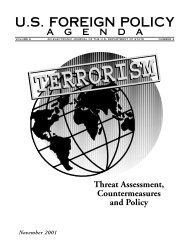Working for Women Worldwide - Embassy of the United States
Working for Women Worldwide - Embassy of the United States
Working for Women Worldwide - Embassy of the United States
You also want an ePaper? Increase the reach of your titles
YUMPU automatically turns print PDFs into web optimized ePapers that Google loves.
Improving protection <strong>for</strong> women in conflict situations<br />
and <strong>for</strong> refugee women and girls and ensuring<br />
that humanitarian programs focus on <strong>the</strong>ir needs and<br />
concerns are U.S. government goals. In Fiscal Year<br />
2003, <strong>the</strong> U.S. Department <strong>of</strong> State provided over $4<br />
million <strong>of</strong> its contributions to <strong>the</strong> U.N. High<br />
Commissioner <strong>for</strong> Refugees (UNHCR) <strong>for</strong> women<br />
and children’s special programming. In addition, it<br />
gave more than $2 million to UNHCR and nongovernmental<br />
organizations (NGOs) <strong>for</strong> genderbased<br />
violence-prevention programs. The article<br />
“Building Peace in War-Torn Countries” points out<br />
that since 2002, <strong>the</strong> <strong>United</strong> <strong>States</strong> has provided some<br />
$10 million to NGOs <strong>for</strong> programs that focus on<br />
prevention and response to rape, sexual exploitation,<br />
domestic violence, and more. In over 15 conflict areas<br />
where women are at risk—including East Timor,<br />
Eritrea, Kosovo, Liberia, Pakistan, Sierra Leone, and<br />
Uganda—NGO grantees on <strong>the</strong> ground provide<br />
counseling, health care, and legal aid to victims <strong>of</strong> violence;<br />
<strong>the</strong>y teach girls how to resist sexual exploitation;<br />
and <strong>the</strong>y educate entire communities about preventing<br />
domestic abuse.<br />
Among <strong>the</strong> <strong>for</strong>ms <strong>of</strong> violence against women <strong>the</strong><br />
<strong>United</strong> <strong>States</strong> is fighting both domestically and internationally<br />
are <strong>the</strong> rise in trafficking in persons and <strong>the</strong><br />
harmful practice <strong>of</strong> female genital cutting, which is<br />
spreading through immigration to more countries.<br />
The <strong>United</strong> <strong>States</strong> has sought to renew <strong>the</strong> world’s<br />
attention to <strong>the</strong>se scourges, allocating additional<br />
resources to eliminate <strong>the</strong>m.<br />
Trafficking in Persons:<br />
A Human Rights Concern<br />
Human trafficking is first and <strong>for</strong>emost a grave<br />
violation <strong>of</strong> human rights. It inflicts unspeakable physical<br />
and psychological damage on its victims, primarily<br />
women and children, and it feeds growing global<br />
health problems, such as sexually transmitted diseases<br />
and HIV/AIDS. It also fuels organized crime, undermining<br />
<strong>the</strong> safety and security <strong>of</strong> communities<br />
throughout <strong>the</strong> world.<br />
Emphasizing <strong>the</strong> U.S. commitment to ending this<br />
plague, President Bush brought international attention<br />
to trafficking in persons during his 2003 U.N.<br />
General Assembly address. He announced <strong>the</strong> launch<br />
<strong>of</strong> a $50-million U.S. anti-trafficking initiative. “We<br />
must show new energy in fighting back an old evil,” he<br />
said. “Nearly two centuries after <strong>the</strong> abolition <strong>of</strong> <strong>the</strong><br />
transatlantic slave trade, and more than a century after<br />
slavery was <strong>of</strong>ficially ended in its last strongholds, <strong>the</strong><br />
trade in human beings <strong>for</strong> any purpose must not be<br />
allowed to thrive in our time.” In June 2004, <strong>the</strong><br />
Department <strong>of</strong> State announced that <strong>the</strong> recipients <strong>for</strong><br />
<strong>the</strong> president’s new anti-trafficking initiative would be<br />
Brazil, Cambodia, India, Indonesia, Mexico, Moldova,<br />
Sierra Leone, and Tanzania.<br />
The Bush administration has provided more than<br />
$295 million to support anti-trafficking programs in<br />
more than 120 countries. This funding helps countries<br />
to develop laws, create special law en<strong>for</strong>cement units to<br />
investigate cases, rescue victims, build emergency shelters,<br />
conduct voluntary repatriation <strong>for</strong> displaced victims,<br />
run in<strong>for</strong>mation and awareness campaigns, and<br />
create long-term rehabilitation and vocational training<br />
programs.<br />
As <strong>the</strong> president mentioned in his U.N. address,<br />
state-sanctioned ownership <strong>of</strong> human beings ended<br />
early in <strong>the</strong> 20th century. However, each year an estimated<br />
600,000 to 800,000 people are illegally trafficked<br />
as slaves across international borders. Millions<br />
more are trafficked within <strong>the</strong> borders <strong>of</strong> <strong>the</strong>ir own<br />
countries. Estimates <strong>of</strong> <strong>the</strong> total number <strong>of</strong> victims <strong>of</strong><br />
trafficking reach <strong>the</strong> millions.<br />
According to Ambassador John R. Miller, senior<br />
advisor to <strong>the</strong> U.S. Secretary <strong>of</strong> State and director <strong>of</strong><br />
<strong>the</strong> State Department’s Office to Monitor and<br />
Combat Trafficking in Persons, U.S. data find that 80<br />
percent <strong>of</strong> <strong>the</strong> trafficked persons are female and up to<br />
50 percent are children. “Sex slavery ... is <strong>the</strong> dominant<br />
<strong>for</strong>m,” he noted, “<strong>the</strong>n domestic servitude, both <strong>of</strong><br />
which are largely women or girls. What was once a<br />
race issue has become primarily a gender issue.”<br />
Ambassador Miller feels “a corner has been<br />
turned” in increasing global attention to this problem.<br />
He called <strong>the</strong> 8,000 or so prosecutions and 2,800 convictions<br />
worldwide in 2003 an “enormous” increase.<br />
And he pointed to a number <strong>of</strong> U.N. protocols and<br />
o<strong>the</strong>r international covenants calling <strong>for</strong> <strong>the</strong> abolition<br />
<strong>of</strong> trafficking in persons.<br />
In <strong>the</strong> <strong>United</strong> <strong>States</strong>, rising awareness <strong>of</strong> this<br />
modern-day <strong>for</strong>m <strong>of</strong> slavery and its consequences also<br />
has intensified advocacy by faith-based and human<br />
rights nongovernmental organizations. Coupled with<br />
data that showed <strong>the</strong> <strong>United</strong> <strong>States</strong> was a growing destination<br />
<strong>for</strong> victims, advocacy ef<strong>for</strong>ts led to passage <strong>of</strong><br />
<strong>the</strong> Trafficking Victims Protection Act (TVPA) in<br />
2000, and amendments that streng<strong>the</strong>ned it in 2003.<br />
Among its most significant provisions are protections<br />
51












